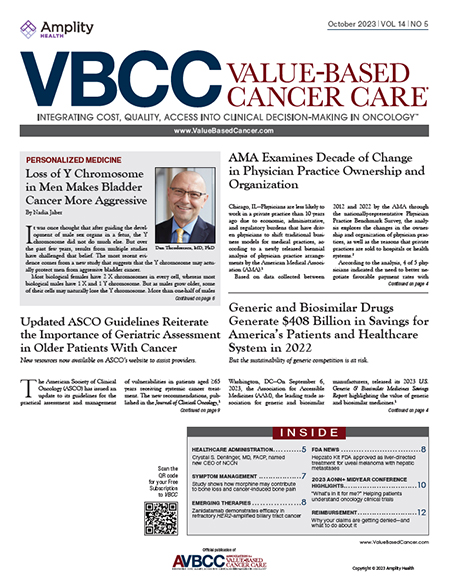Multiple Myeloma
On March 2, 2020, the FDA approved isatuximab-irfc (Sarclisa; Sanofi- Aventis), a CD38-directed cytolytic antibody, for the treatment of adults with multiple myeloma, for use in combination with pomalidomide (Pomalyst) and dexamethasone, in patients who had received at least 2 therapies that include lenalidomide (Revlimid) and a proteasome inhibitor. The FDA granted isatuximab an orphan drug designation.
By Phoebe Starr
Orlando, FL—The investigational B-cell maturation antigen (BCMA)-directed chimeric antigen receptor (CAR) T-cell therapy known as JNJ-4528 induced responses in 100% of 29 evaluable patients with heavily pretreated relapsed or refractory multiple myeloma, according to the results of the phase 1b/2 CARTITUDE-1 clinical trial reported at ASH 2019.
Read ArticleBy Phoebe Starr
Orlando, FL—The investigational dual-targeted CD38 chimeric antigen receptor (CAR) T-cell therapy achieved an objective response in more than 90% of patients with relapsed or refractory multiple myeloma who had received ≥3 previous therapies and whose disease had spread outside of the bone marrow. Furthermore, the therapy cleared extramedullary lesions in almost all patients with these lesions, according to results presented at ASH 2019.
Read ArticleThe past week in oncology-related news includes shortages of crucial pediatric cancer drug, results of a study of racial disparities in multiple myeloma, and new drug on the horizon for HER2 metastatic breast cancer.
Read Article FDA Approvals, News & Updates, Hematologic Malignancies, In the News, Multiple Myeloma, Personalized Medicine
On September 26, 2019, the FDA approved daratumumab (Darzalex; Janssen) in combination with bortezomib, thalidomide, and dexamethasone for the treatment of newly diagnosed patients with multiple myeloma who are eligible for autologous stem-cell transplant (ASCT). The FDA granted this application priority review.
Read ArticleOn June 27, 2019, the FDA approved daratumumab (Darzalex; Janssen) in combination with lenalidomide (Revlimid; Celgene) and dexamethasone for the first-line treatment of patients with multiple myeloma who are ineligible for autologous stem-cell transplantation (ASCT). This approval was granted a priority review and used the Oncology Center of Excellence Real-Time Oncology Review program. This is the sixth indication for daratumumab in multiple myeloma and the second indication for newly diagnosed patients.
Read ArticleOn July 3, 2019, the FDA granted accelerated approval to selinexor (Xpovio; Karyopharm Therapeutics), a nuclear export inhibitor, in combination with dexamethasone, for the treatment of patients with relapsed or refractory multiple myeloma who have received ≥4 previous therapies and did not respond to other forms of treatment, including ≥2 proteasome inhibitors, ≥2 immunomodulatory agents, and an anti-CD38 monoclonal antibody. The FDA reviewed selinexor using its fast track program, and granted it an orphan drug designation.
Read ArticleUntil recently, patients with newly diagnosed multiple myeloma who are ineligible for autologous stem-cell transplantation (ASCT), the multiagent regimen with lenalidomide (Revlimid) and dexamethasone was the standard of care. Results of the prespecified interim analysis of the MAIA trial demonstrated the benefit of adding daratumumab (Darzalex) to this combination therapy (Facon T, et al. N Engl J Med. 2019;380:2104-2115).
Read ArticleBy Phoebe Starr
A dizzying array of new chimeric antigen receptor (CAR) T-cell therapies targeting the B-cell maturation antigen (BCMA) designed specifically for the treatment of multiple myeloma was presented at the 2018 American Society of Hematology (ASH) annual meeting. BCMA-targeted CAR T-cell therapies are designed to improve T-cell persistence, depth of response, and tolerability. Response rates reported at ASH 2018 range from 70% to 100%, depending on the patient population and the use of previous regimens.
Read Article

